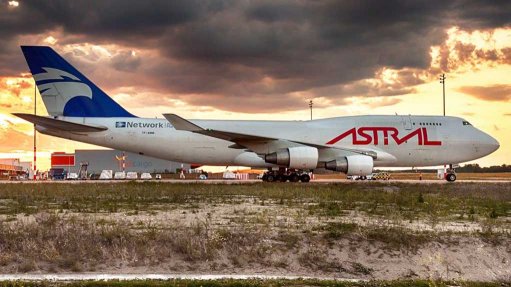
Astral Aviation’s Boeing 747-400F
Photo by: Astral Aviation
Kenyan dedicated air cargo operator Astral Aviation (Astral) and Indian carrier SpiceXpress (the air cargo operation of low cost airline Spicejet) have signed a cargo interline agreement. Described as a “pioneering” initiative, it will allow the expansion of both Astral’s Indian network and SpiceXpress’ African network.
“Thanks to this interline agreement, there will be easier trade between India and Africa allowing movement of commodities at much more competitive rates in the respective markets as well as providing more scheduled frequencies of flights to the benefit of our customers and traders,” affirmed Astral CEO Sanjeev Gadhia. The agreement would allow Astral to expand its network to the Indian cities of Bangalore, Chennai, Delhi, Hyderabad and Mumbai. These would be connected through its Middle Eastern hub of Sharjah (in the United Arab Emirates) with Nairobi and many other African centres.
“This interline agreement will strengthen the trade lanes between the two continents and provide much faster and seamless logistics solutions,” highlighted SpiceXpress CEO Sanjiv Gupta. “It will help SpiceXpress build its African network and ensure SpiceXpress’ presence in the high growth African continent.”
The agreement would permit SpiceXpress to greatly increase its access to African markets. It would now be able to ship cargo to and from Dar es Salaam (Tanzania), Entebbe (Uganda), Hargeisa (Somalia), Johannesburg (South Africa), Juba (South Sudan), Lusaka (Zambia), Mogadishu (Somalia), Mwanza (Tanzania), Nairobi (Kenya), Pemba (Mozambique) and Zanzibar (Tanzania).
Astral operated a fleet of dedicated freighter versions of a number of turboprop and jet airliners. These were the Fokker F27 (with a payload of 5 t), McDonnell Douglas DC9 (15 t payload), the Boeing 727-200F (24 t payload), a leased Boeing 767-200BCF (42 t payload) and a wet-leased Boeing 747-400F (124 t payload). These served a network of 50 destinations.
SpiceXpress had three dedicated Boeing 737-700F freighters (20 t payload) and two 737-800Fs (almost 24 t payload), and also used the belly-holds of its parent company’s airliners. It operated across 79 airports.